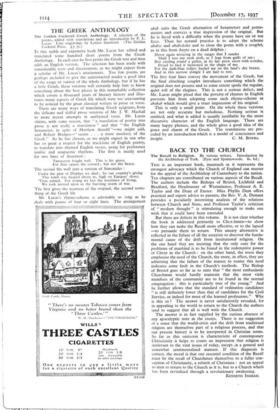THE GREEK ANTHOLOGY
The Golden Cockerel Greek Anthology. A selection of the poems, edited with translations and an introduction by F. L. Lucas. Line engravings by Lettice Sandford. (The Golden Cockerel Press. ,C5 5s.) IN this noble and expensive book Mr. Lucas has edited and translated some hundred short poems from the Greek Anthology. In each case he first prints the Greek text and then adds an English version. The selection has been made with considerable taste and discernment, as we might expect from a scholar of Mr. Lucas's attainments. Too few poems are perhaps included to give the uninstructed reader a good idea of the range or variety of the whole Anthology, but if he has a little Greek, these versions will certainly help him to know something about the best pieces in this remarkable collection
which covers a thousand years of literary history and illus- trates many aspects of Greek life which were too unassuming to be noticed by the great classical writers in prose or verse.
There are many ways of translating Greek epigrams, from the delicate and skilful prose versions of Mr. J. W. Mackail to more recent attempts in unrhymed verse. Mr. Lucas claims, with some reason, that " a translation of poetry into prose is not really a translation " and that " the English hexameter, in spite of Matthew Arnold "—we might add, and Robert Bridges—" seems . . . a mere mockery of the Greek." So he has chosen, as we might expect in one who has so great a respect for the traditions of English poetry, to translate into rhymed English verses, using for preference iambic and anapaestic rhythms. The first is neatly used for two lines of Anacreon : Timocreon fought well. This is his grave.
For Ares spares the coward ; but not the brave.
The second fits well into a version of Simonides : Under the glen of Dirphys we died ; by our country's giving This tomb was heaped above us, high on Euripus' shore. 'Twas earned. For young we lost the loveliness of living, We took instead upon us the bursting storm of war.
The first gives the neatness of the original, the second some- thing of the Greek lilt.
Mr. Lucas's rhyme-scheme is admirable so long as he deals with poems of four or eight lines. The arrangement abab suits the. Greek alternation of hexameters and penta- meters and conveys a true impression of the original. But he is faced with a difficulty when the poems have six or ten lines. Then his normal practice is to adopt the scheme ababcc and ababcdcdee and to close the poem with a couplet,
as in this from Anyte on a dead dolphin :
Never again rejoicing in the surges that I sunder
Shall I toss my neck aloft, as I leap from gulfs of sea ; Nor circling round a galley, at its fair prow snort with wonder, Proud to find it fashioned in the shape of me.
For the dark-blue rollers hurled me on the land's dry breast, And in this narrow shingle I am laid to rest.
The first four lines convey the movement of the Greek, but the final clinching couplet introduces something which the original does not possess and to some extent spoils the regular, quiet roll of the elegiacs. This is not a serious defect, and Mr. Lucas might plead that the poverty of rhymes in English prevents him from adopting some such rhyme-scheme as ababab which would give a truer impression of his original.
This is only a small point. On the whole these versions are not only accurate but melodious. Nothing serious is omitted, and what is added is usually justifiable by the more discursive character of the English language. There are many happy phrases, and the whole gives a good idea of the grace and charm of the Greek. The translations are pre- ceded by an introduction which is a model of conciseness and














































 Previous page
Previous page